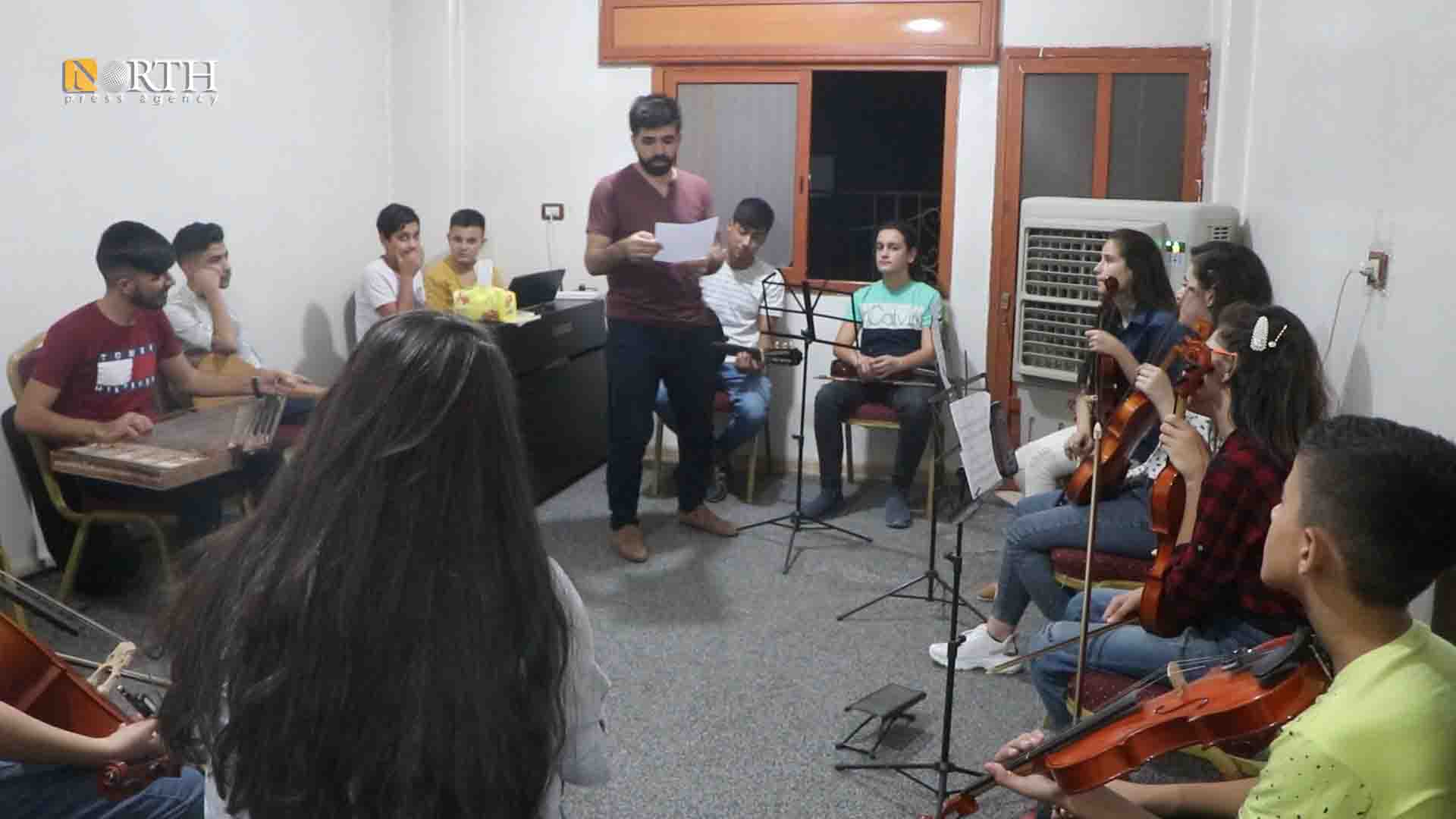HASAKAH, Syria (North Press) – Faraj Darwish was born into a family of thirteen in northern Syria’s Hasakah. His song, Have a Good Day, My City [Roja te Bixêr Ey Bajarê Min], turned into something like Hasakah’s anthem.
He did not start his career with the soft melodies of music, but rather with the harsh clang of smelting and reshaping iron. At that time, he was young and his character was being formed in terms of his language and national identity, and he refused to assimilate.
Some argue that identity is shaped by music, and that this is one of the peculiarities of the Kurdish community in Syria, of which music is an essential part.
From the blacksmith’s workshop to Mesopotamia
Darwish moved from the blacksmith’s workshop to the Mesopotamia Institute of Music in the Salihiya neighborhood in the city of Hasakah, and at the institute he learned music through stringed instruments, surpassing all his peers.
However, he never forgot the seven years he spent blacksmithing and watering the cotton and wheat crops in his village.
Like many young Syrian Kurds, he started playing the Kurdish tanbur instrument. His uncle had an influence on young Faraj, who would watch in wonder as he plucked the strings and sang traditional songs.
Darwish said “My uncle encouraged me; he is the one who told me about studying music. He wasn’t my teacher, but I was learning from him. I played it in front of him, and he showed me the right way to play.”
From the style of his uncle, Darwish moved to a later stage, motivated by his uncle, who advised him to study academically. After he obtained his high school diploma in 2006, he moved to the academic world.
“It was the most rigorous, accurate and demanding world. I applied, and passed, thank God, and started with learning to play the violin in the College of Music in Homs,” Darwish continued.
His academic debut was in 2007, which he considers a milestone in his musical career.
The college had given him, in addition to the musical techniques, the spirit of the musical environment. For him, university meant new memories, new relationships, and a new awareness.
After completing his academic studies in 2012, he returned to Hasakah and took his next step.
He, along with one of his friends, opened an institute to teach music in his home city.
“After my graduation in 2012, I opened a music institute in Hasakah. From 2012 until now, I continued to give music lessons without a break. I am so glad for that,” Darwish added.
East meets west in the orchestra
Darwish has a number of distinct songs, songs that are often sung by the youth of Syria’s Jazira region as if they were part of their memories.
“I’ve recorded seven singles so far, four of which are video clips. Among them was a song that spread widely, about Hasakah. It was titled Roja te bi xêr ey bajarê min [Have a Good Day, My City].”
Faraj notes that several conservatories have recently opened in Hasakah, the first of which was in the city center. A few years later, he opened an institute in the Tel Hajar neighborhood, and for several years he has been in the Salhiya neighborhood.
Darwish further explained, “The institute is currently supported by the Culture Board in the Autonomous Administration; they give us instruments.”
The cities of Jazira previously lacked music education institutes, as the only academic institute he founded in Qamishli was the center of Muhammad Zaza, who obtained a doctorate in musical sciences from Charles University in Prague, Czech Republic.
Darwish says that many of his friends from Hasakah used to go to Qamishli to train at that institute.
“But here in Hasakah, we did not have institutes to teach music. There were a few people who gave amateur lessons.”
Those wishing to learn music learned from their relatives or friends, just as Darwish and his uncle.
Wider opportunities
Today, opportunities have become more widespread and professional learning is available. Darwish says that many parents want to teach their children musical instruments.
Dozens of children and teenagers are being trained on musical instruments at the Mesopotamia Center of the Culture and Art Board of the Autonomous Administration.
Darwish pointed out that “they give us instruments like qanun, cello, piano, and clarinet, and all the instruments we want and need to form an orchestra in both the western and eastern styles.”
He said that they began preparing for this about a year and a half ago, but the spread of coronavirus and the subsequent preventative measures have stopped their work during the past five months.
He adds that they are back to work. “We have many plans for future that we will work on, God willing, we are now following a rehearsal program. We do this because we want to develop music and because we love it, and we want to spread this love of music in people’s hearts,” he concluded.

